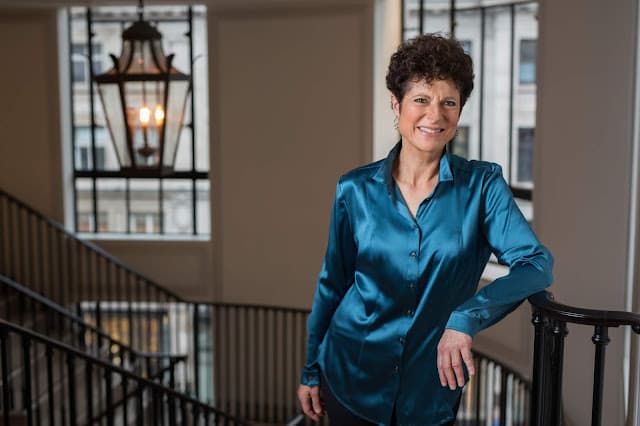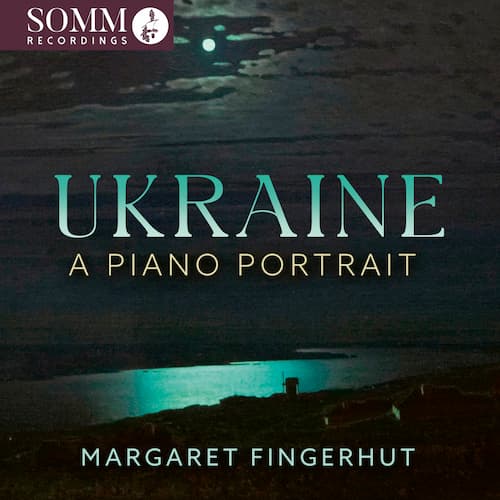The Russian invasion of Ukraine in February 2022 prompted English pianist Margaret Fingerhut to explore her Ukrainian roots through music. Her grandfather emigrated from Odessa to the UK to avoid the Jewish pogroms at the turn of the 20th century. Fingerhut cites other Odessa émigrés, including Benno Moiseiwitsch, Shura Cherkassky, Emil Gilels, David Oistrakh, Nathan Milstein, George Gershwin’s parents, Bob Dylan’s grandparents. Western music has much to thank one city for!

Margaret Fingerhut (photo by Andy Tyler)
Starting with the music of Sergei Bortkiewicz, she made a video on YouTube with Ukrainian filmmaker Viktoriia Levchenko to the music of Bortkiewicz, showing the beauty and variety of the country and then the destruction and devastation that followed. It closes with two cogent quotes by Volodymyr Zelensky. This is the work with which she opens her new recording: Ukraine: A Piano Portrait.
Bortkiewicz: Les Rochers d’Outche-Coche played by Margaret Fingerhut, piano
Fingerhut’s survey of Ukrainian piano music between 1877 and 2005 aims to transport listeners to the heart of the beleaguered country, showcasing its multifaceted moods: ‘dark, sad, and tragic, of course, but also richly romantic, heroic, triumphant, joyous, and even humorous.’
Bortkiewicz’ work, written in 1908, is part one of the larger Sketches of Crimea that used the mountainous scenery and history of the peninsula for inspiration.
Two preludes from 1908 by Vasyl Barvinsky were written when he was 20, and his piano cycle from 1915, Loneliness, the Sorrow of Love, are works by one of the leaders in Ukrainian art music. Barvinsky was a composer, pianist, conductor, teacher, and musicologist; he was jailed by the Communists in 1948 and when he emerged a decade later, many of his music and writings had been destroyed.
A more light-hearted work is Mykola Lysenko’s Rhapsody on Ukrainian Themes No.2, Dumka-Shumka. Lysenko is the composer of Prayer for Ukraine, which has become the spiritual anthem of the country. He is also known as the father of the ‘dumka’, which is familiar in the works of Tchaikovsky, Dvořák, Janáček, and Martinů.
Next are 3 Preludes by Levko Revutsky, which are full of very different feelings. His Improvisation, written between 1920 and 1930, starts simply and then gets as complicated as he can make it. Revutsky was a student of Lysenko and, later, edited his works for publication.
Viktor Kosenko’s Nocturne-Fantaisie, written in 1919, shortly after his graduation from the St Petersburg Conservatory. This combination of night music and dreams shows the influence of Scriabin, who had died in 1915, but also has its own distinctive ending, ‘gradually winding down into a dark emptiness’. Although born in St Petersburg, after graduation, Kosenko moved to the north-western Ukrainian city of Zhytomyr, where he taught at a local music school.
Viktor Kosenko: Nocturne-Fantaisie
Valentin Silvestrov’s Bagatelles offer a light, child-like intermission before Boris Lyatoshinsky’s Two Preludes on the Melodies of Ukrainian Folk Songs send us into the nationalism that was Ukraine in full battle mode during WWII. It’s followed by his Elegy-Prelude, the mourning that follows the fighting.
Fingerhut ends the album with a return to her first composer, Sergei Bortkiewicz and his Consolation, Op.17, No.4. This was No. 4 of an 8-part Lamentations et consolations published in 1914 and dedicated to the pianist Moriz Rosenthal. For her, it’s a sweet lullaby that is the hope for peace.
Fingerhut credits the training that many composers from Ukraine received in the great conservatories of Moscow and St Petersburg, but in the end, Ukraine must claim her own. An extraordinary list of performers, including Sergei Prokofiev, Benno Moiseiwitsch, Shura Cherkassky, Emil Gilels, Vladimir Horowitz, David Oistrakh, Nathan Milstein, Nikolai Malko, and Jascha Horenstein, are all Ukrainian and not Russian.
Fingerhut’s reflection on the musical heritage of Ukraine gives us an album of dark moods. The few lighter pieces do much to lift the atmosphere but overall, it’s a dark album. As she notes, you won’t discover new works on here but will find ‘sincerity and authenticity of feeling’. It’s a beautifully played and thoughtful collection.

Ukraine: A Piano Portrait
Margaret Fingerhut, piano
SOMM recordings SOMMCD 0701
Release date: 18 April 2025
For more of the best in classical music, sign up for our E-Newsletter
